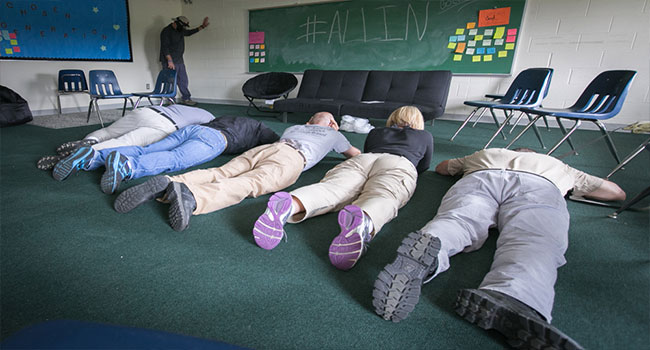
School Administrators Grapple With Mental Health Consequences of Active Shooter Drills
In Pennsylvania and Florida, staff and students are trying to understand how these trainings affect their psyches while also trying to prepare for the possibility of a school shooter.
- By Haley Samsel
- August 21, 2019
As more states require regular active shooter drills in schools, educators and school safety professionals are seeking to answer a larger question: How do these drills affect the mental health of the people who participate in them?
In Pennsylvania, schools must conduct a school security drill within the first 90 days of the school year thanks to a 2018 revision to the state code. PublicSource, a nonprofit news organization based in Pittsburgh, recently dug into the effects of the drills on the sense of safety among students, staff and teachers.
Faculty and staff in Pittsburgh go through the ALICE training, an acronym for Alert, Lockdown, Inform, Counter and Evacuate. Farooq Al-Said, a gym teacher in a K-8 school, said he found the training valuable because it standardizes response for all staff and faculty and goes beyond lockdown measures that are not always effective.
But he told PublicSource that he remains skeptical whether ALICE’s teachings about “countering,” or taking on a shooter, actually prepare participants to do so. Al-Said added that the training’s inclusion of a shooter scenario led to negative reactions from staff members.
“When we did our ALICE training, there were some people who had anxiety attacks before it even happened,” he said. “They just couldn’t cope with the possibility that someone was going to shoot.”
Despite the rise of school shootings, there has not been a breadth of research done on how drills and lockdowns affect the mental health of students and faculty. Jillian Peterson, assistant professor of criminology and criminal justice at Hamline University, published one of the only studies conducted on mental health and active shooter drills in 2015.
She found that a school shooting training video affected community college students by increasing anxiety and fear, especially among female students. But Peterson told PublicSource that the topic is hard to study because there are “so many other factors at play” when it comes to mental health and trainings.
Peterson also worries that ALICE trainings might actually inspire some violence from students.
“As a psychologist, I am also concerned because we know there is a social contagion aspect of school shootings,” Peterson said. “It's possible that drills trigger a fascination in vulnerable students, and that we are contributing to the contagion.”
Outside of Pennsylvania, school districts in Florida are now legally required to provide emotional health education to middle and high school students alongside a mandate to hold active shooter drills every month from preschool through 12th grade.
Mary Bridges, the senior director of student services for the Orange County Public School District, told WLRN that teachers go through training each year on how to hold the drills and handle student anxiety that might present itself during the monthly lockdowns.
Like other educators and parents, Bridges said she would like to see fewer drills for elementary school students. But she said that if the drills are presented in an age-appropriate way like with fire and tornado drills, then students “understand that you’re just trying to keep them safe.”
“You want to make sure that you know how to work with [students] and make sure that you're not adding to their anxiety because school may be the only place that they feel safe,” Bridges said.
Many students also see the value in practicing their response to an active shooter, including Pittsburgh student Rosie Gwin. She said that the trainings are necessary because school shootings happen “too often.”
“Because what if something happened and we never got taught this? We would have no idea what to do,” Gwin said.
About the Author
Haley Samsel is an Associate Content Editor for the Infrastructure Solutions Group at 1105 Media.